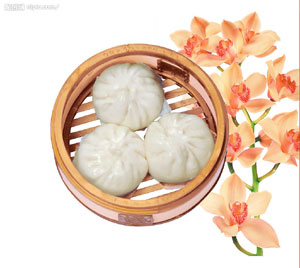
Goubuli steamed stuffed buns are synonymous with Tianjin, a city 30 minutes away from Beijing by high-speed bullet train.
The chain’s beginnings go back to 1858 and a young man named Gao Guiyou from Yangcun of Wuqing County known as “Gouzi,” or “puppy.” At the age of 14 he became an apprentice at a food store by the Southern Canal. The chefs took a shine to him, and under their tutelage he learned the craft of making steamed stuffed buns.
Upon finishing his three-year apprenticeship, Gouzi set up his own food store namede Dejuhao. It soon began to attract regular customers, drawn by Gouzi’s special stuffed buns. To prepare them, half-leaven dough was rolled into thick circular wrappers 8.5 cm in diameter. The filling contained a precise ratio of fat to lean pork of three to seven, mixed with traces of water, pork stock, sesame oil, soy sauce, smashed ginger and scallions, and other ingredients. The filling was added and the wrapper pinched together to make 18 tucks, like a white chrysanthemum, and steamed.
Gouzi’s creation was soft and tasty, and not oily like other similar types of buns. The color, shape, taste and aroma all stood out, attracting more and more customers from further away.
Due to his popularity, Gouzi was always busy making and selling his specialty, with no time to talk to customers. “Gouzi sells stuffed buns, but never talks to customers,” they would joke to each other, and this gradually shortened to just three syllables – “Goubuli” – which can be translated as “the dog doesn’t talk to people.” Soon people stopped calling Gouzi’s food store by the name he had chosen, Dejuhao, renaming it Goubuli. Goubuli steamed stuffed buns have existed for over 140 years and its generations of chefs have made innovations and improvements to the fillings over time. Now the brand serves steamed buns stuffed with over 100 different fillings in six categories, including minced pork, seafood, edible wild herbs, and crab meat. Goubuli has become a household name in China and developed into an international company with branches in Japan, the U.S., and Britain.
(China Today) Editor:Yang Xin
